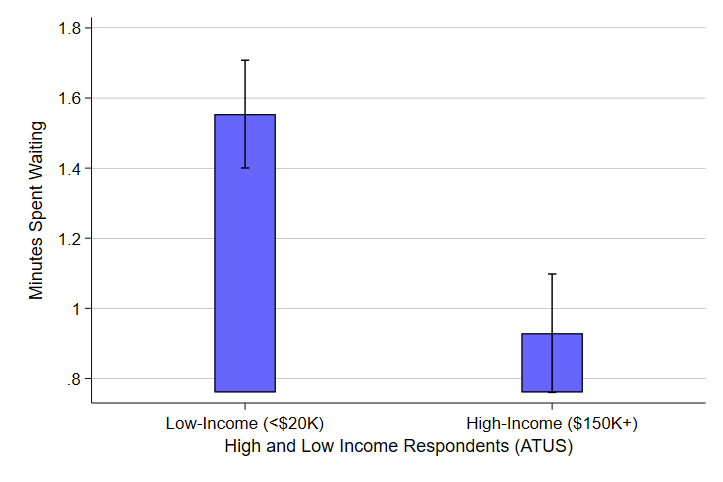A convo last night noted that, anecdotally, low-income people often take entire days for routine appointments that high-income folks usually schedule for a long lunch. I got curious about the income gap in time spent waiting for things, so I looked it up in the ATUS. 1/n
For the uninitiated, the ATUS collected time diary data on how people spend their time in an average day each year in a national sample. 2/n
For a quick and dirty look, I added time spent waiting on caring for kids& #39; health and school, caring for adults, waiting for household, childcare, and personal car services, waiting for financial and government service, waiting for job interviews, and waiting for shopping. 3/n
Accounting for time trends and applying sampling weights, this is just the average time spent waiting for stuff. Look at that gap! High-income folks spend 40% less time waiting on stuff that everyone uses! 4/n
An this is the gap when we condition on non-zero time. Even among those who spent some time waiting on stuff, high-income folks spend much less time waiting around (about 30 minutes versus 41 minutes, on average - about 27% less time). 5/n
There& #39;s surely a whole bunch of potential reasons for this, this just looks at averages and is not from a research project or anything, but I find it interesting. These are average differences on an average day, so these gaps add up to a ton of time throughout the year. 6/n
@donmoyn has brought attention to the importance of administrative burdens in public programs (and surely that explains part of this), but I think there a variety of admin. and other burdens low-income folks face across sectors and services. 7/n
Some of this may also be a neighborhood quality story too wherein low-income folks are sorted (often as a result of policy failures) into areas with services that are overburdened, under supported, and struggling to perform. 8/n
Some of it might be demands and expectations, social capital, or any number of things. Regardless, that gap in time spent waiting around for routine services is less time for work, family, or fun and is another area where poverty has a bunch of hidden burdens. 9/n
Finally, excluding waiting for job interviews doesn& #39;t change the gap much. One could probably learn a lot just pouring over this with more rigor descriptively. h/t @ajaynemarr. 10/end.

 Read on Twitter
Read on Twitter



